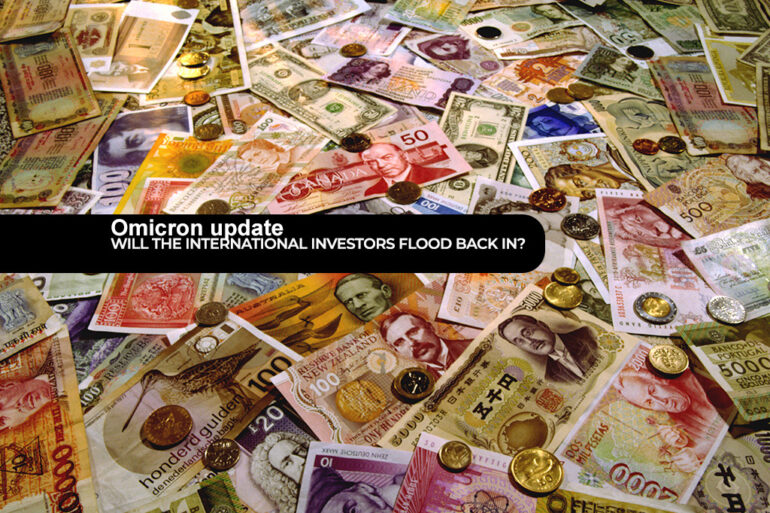Will Omicron Sack International Investors that Might Flood the Market Now the Travel Ban is Lifted?
Update 11/29/21:
Since we published our article, there has been a new and potentially threatening COVID variant Omicron originally detected in South Africa. We are now being told that this variant could be resistant to even a third booster vaccinated person! This news is particularly unwelcome globally due to all the festive and religious holidays coming up in the next four weeks.
Many countries are imposing travel restrictions once more; Argentina announced today that anyone that has been to the African continent within the last 14 days must undergo a mandatory 14-day quarantine, with the same quarantine rules applying to Australian citizens. The USA, Canada, Russia, Brazil, Japan, Saudi Arabia, EU countries, Australia, and the UK, are amongst many anxious nations that have banned travel from many African countries, including South Africa, Namibia, Botswana, Zimbabwe, Mozambique, Lesotho, and Eswatini.
The UK is also imposing on all people traveling back to the UK that a mandatory day 2 PCR test must be administered and two-days of isolation until a negative test result is completed.
The World Health Organization (WHO) has already categorized Omicron as a ‘variant of concern and warns it could impose a greater risk than the Delta variant. Omicron has spread to travelers in Belgian, Hong Kong, and Israel. Israel announced in the last three days those borders are closed to all foreign travelers, regardless of vaccination status. WHO stated today, 11/29/21, that the overall global risk related to the newly discovered variant “is assessed as very high”. EU Commission President Ursula von der Leyen asserted that “flights will be suspended until we have a clear understanding about the danger posed by this new variant, and travelers returning from this region should respect strict quarantine rules”.
Dr. Anthony Fauci, chief medical advisor to the President, reiterated today the importance of Americans to get vaccinated and booster as the government continues to learn more details about the new Omicron variant.
Late Monday afternoon Moderna’s Chief Medical Officer, Dr. Paul Burton, said Moderna is testing its Covid-19 vaccine against the new Omicron variant, which he is watching with concern. He said research from Seattle suggests the Omicron variant probably emerged in South Africa or Botswana and exploded in early November to become the now dominant strain.
At this point in time, it’s too early to tell if this will affect real estate markets, especially ones in Florida until more is known about the Omicron variant, how severe it is and how much more transmissible it is then other current dominant forms of Covid-19.
If Omicron proves to cause more severe cases of the virus, and it is more transmissible, then we will certainly see every part of the economy take a major blow. Keep checking back as we will keep you up to date on this new variant and it’s effect on the Florida housing market.
US Travel Ban Lifted
As of November 8, 2021, the U.S. travel ban for 33 countries was lifted. What does this mean for real estate? A lot, actually.
In 2018, foreign investors spent $267 billion on U.S. real estate. Once the pandemic hit and restrictions came into place, that number fell to $107 billion in 2020, according to the National Association of Realtors (NAR). What, and more precisely who, is behind those numbers? Let’s take a closer look.
Who Is Buying?
Many countries around the world invest in U.S. real estate. However, there are five countries in particular that buy the most:
- Canada
- China
- Mexico
- India
- The UK
Before the shutdown, China was the biggest player, but due to national policies their purchases have decreased by more than 50% since 2017. The potential new frontrunner at this point is Canada. In 2020, they only trailed Chinese purchases by $2 billion, with China buying $11.5 billion of real estate and Canada accounting for another $9.5 billion.
Many international real estate investors are high net worth individuals. These investors have been counting on the security of the American economy and real estate market for years. Also, many of them have done well through the pandemic and are now looking for trophy properties in New York, L.A., and Miami.
Real estate in the U.S., whether a mansion, condo, or single-family dwelling, is a safe place to park capital for many individuals who are concerned about political or social instability in their native countries. There are also those who just want to have a vacation home in the U.S.
So, where are they buying?
Trending Markets
Florida is the number-one destination for many of these buyers. With the pandemic, we saw people flock to warmer climates and places they’ve always wanted to live as remote work became the norm. According to Banesco USA, the pandemic and regularity of remote work brought upwards of 1,000 people and several corporate relocations to the Sunshine State each day.
Add to that Florida’s history as the top destination for foreign buyers, and you’ve got a recipe for high demand.
Well before the pandemic, Florida snagged 20% of our nation’s total overseas investors. With California following behind at 16%, Florida had and continues to have a strong lead.
According to the latest data from Redfin, Florida has claimed five of the top ten metros with the fastest growing sales prices: Hollywood, Cape Coral, St. Augustine, Port St. Lucie, and Riverview.
Where in Florida are people going? Miami has been a long-time favorite of foreign investors and is expected to continue that legacy. Seaside properties make up a large portion of foreign purchases (between Miami, L.A., and New York), and that is not projected to change anytime soon.
Keep in mind that while these investors are coming in hungry to buy, they tend to prefer the high-end luxury market. Brokers also admit there is a tendency in foreign investors to buy new construction.
While that may make things tricky for you if you’re planning on bidding on a new development, this shouldn’t create extra competition with any fixer uppers you’ve had your eye on.
The Market as a Whole
There is no doubt that prices are up, with the average national price for a property at $375,639. As of the latest data, year over year prices are up while the average number of new builds and days on the market is down. With a national average of 18 days on the market, it is still by and large a seller’s market out there.
However, that doesn’t mean it will stay that way. In a previous article, we mentioned that we could be due for a change sooner than you might expect.
What Will This Mean for Domestic Investors?
Though the market is soaring now, all that goes up must come down. And by that, I mean the exponential growth over the last year is not going to last.
With that said, foreign investors could add a bump to the competition, particularly in the coastal regions. According to the NAR, from August 2019 to July 2020, foreign buyers made up 11% of existing home sales in Florida. Meanwhile, the national average of purchases by foreign buyers is only 3%.
Clearly, Florida still leads the way in foreign sales, yet that leaves a whopping 89% for domestic investors.
There’s no need to sound the alarm with international flights and showings picking back up. Yes, there will be more buyers out there, but they’re spread across the whole country. There’s been a scramble for realtors to get foreign buyers into properties, but that’s because they’ve been waiting for nearly two years.
Florida may be the top destination for foreign investors to buy into, but they don’t have boots on the ground like you. The initial excitement of in-home showings will pass once international travel regains normalcy, and you’ll keep on growing!








